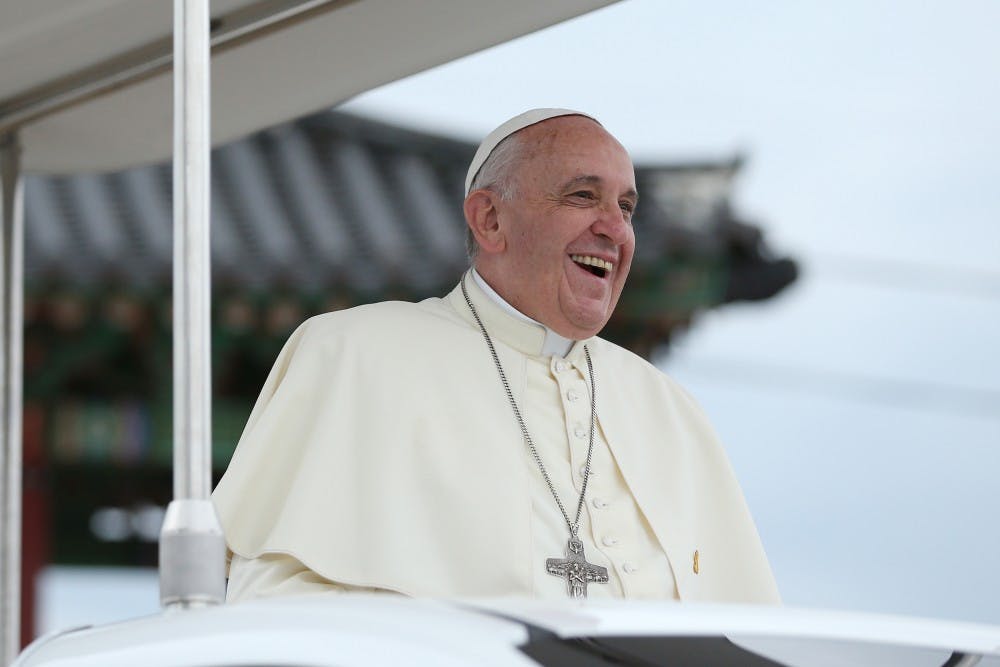When Pope Francis visited Philadelphia in September, Penn professors and students alike flocked to Eakins Oval in Center City to partake in this historical moment.
But now that the crowds have dispersed with Penn students back on campus for their spring semester, and the pope already prepared for his next visit in February to Ciudad Juarez, Mexico, and his new book on mercy having been freshly printed and released worldwide at the turn of the new year, a question still lingers: What did the pope’s visit actually “do” and how has it affected opinions of people of different religious faiths at Penn?
Penn professor Melissa Wilde, whose work includes a book with a new explanation of the 1964 reformation of the Catholic Church, explained that the pope’s visit was the chance of a lifetime for anyone, regardless of his or her religion but especially for practicing Catholics.
“I think Francis is unique in the sense that he got a lot of media attention and he has demonstrated that he’s a different kind of pope,” Wilde added. “For people who were raised Catholic but maybe have a lot of problems with the Church, usually about issues connected to sex and gender, [they] see him as a more open pope. Maybe not precisely on those issues, but in general more than recent popes and they’re totally right about that.”
Wilde noted the pope's appeal to Penn students is likely more for his stance on homosexuality than for his simple lifestyle.
"Penn students are pretty privileged and probably don’t have a problem with the pope wearing Prada shoes,” Wilde said.
With more than 24,000 undergraduates at a university with 450 plus student-run clubs and organizations, the reasons students chose to see the pope speak are bound to vary for both religious and nonreligious students. For some Penn students, the pope’s visit served as an active learning opportunity to enhance their studies.
“From a secular standpoint, I was interested [in the pope’s visit] because as an emerging artist and writer I think it’s really helpful to go to see how people respond to this cultural phenomenon,” College senior Gina DeCagna said. “I think the pope reaches out to a more contemporary audience, younger generations of people, and inspires us to be better Catholics and better humans in general.”
“It felt like a rock concert, or something. A festival, in a weird way,” DeCagna added. “I was also interested in talking to people and seeing why they were motivated to go as well.”
And still for some students of non-Catholic faith, their own background with spirituality influenced their decision to see the pope.
"All the time people think that Christians are these stock conservatives, that we are different from others," Wharton sophomore Emily Zhen said, "but in reality [the pope] shows how understanding and loving Christians are while still adhering to the faith.”
For Bioengineering senior Aardra Rajendran, her beliefs in Hinduism aligned with Pope Francis’s policies on interfaith community and inspired her to go see him. “For me personally, no matter who comes, I love hearing people’s truths,” the former president of the Penn Hindu Student Council and Young Jains of America said.
“Hinduism gives me the peace to listen to other people’s truths without any kind of judgment of feelings that my truth is superior to anybody’s truth because it’s so adamant that there are multiple paths to the same God. To consider someone else’s truth as superior or inferior is completely counter [to Hinduism],” Rajendran added.
Rajendran believes that unlike his predecessors, Pope Francis is breaking religious barriers and setting up a space for meaningful interfaith dialogue.
According to International Business Times, for Hindus, whose global numbers nearly match that of the world’s Catholics, the election of Pope Francis was cautiously welcomed by the Hindu-American Foundation. Pawan Deshpande, a member of the HAF council, had expressed hope for a new era of the papacy expressing mutual respect for pluralistic religions.
For Rajendran, Pope Francis is seen as a figure who is respected within the Hindu community at Penn with his ongoing dialogue with people of different faiths.
“We are at a stage where faith as a whole is on the decline, no matter what faith we’re in,” Rajendran said. “You can see that that faith is on the decline because people have started seeing religion as something that brings a lot of suffering. It brings separateness between people rather than universality.”
However, Rajendran was uncertain that if a Hindu figure came to Philadelphia, he or she would receive a similar turnout. “If Christianity wasn’t such a global religion, he might not be such a global figure,” she said.
From the perspective of the Jewish community, Religious Studies professor Steven Weitzman believes that it’s important for students to keep in mind that despite the tensions that are deeply embedded in the history of Jewish-Catholic relations, the last 50 years have been a revolutionary period.
“This pope has continued that effort and he’s great on interfaith relations in general,” Weitzman added. “He went to Philadelphia, he went to New York and did this great interfaith ceremony at the World Trade Center. So it’s really been wonderful to see this pope embrace Jews as religious equals and be so open to them.”
While it’s no doubt that most students, already charmed by Francis at a distance, will feel even more fondness for the pope having seen him up close and personal, the same could be said about past papal visits to the United States — all are showcases designated to revitalize faith, hope, and unity.
It will be a continuing conversation as it takes time to assess a pope’s lasting impact, as it depends on not just his words, but also how his audiences continue to respond now that he’s left.









